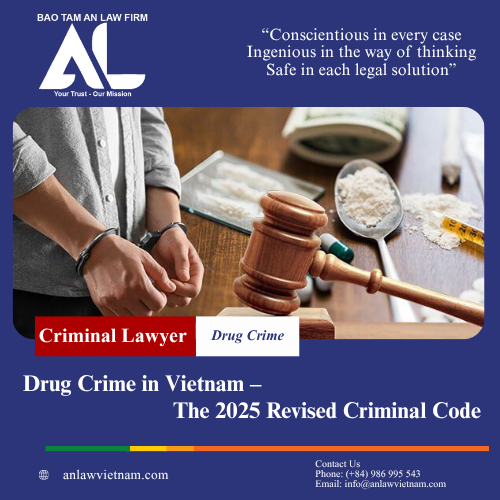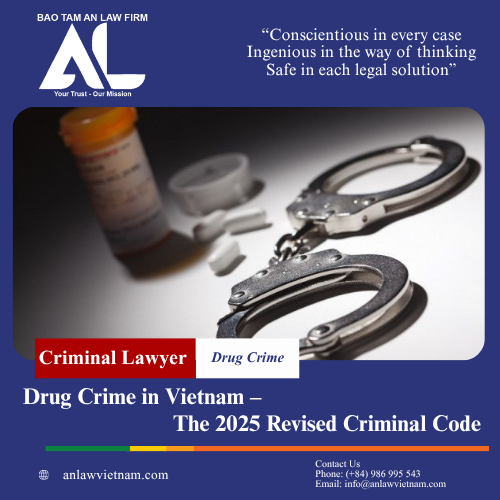Drug Crime In Vietnam – Criminal Code (Amended And Supplemented In 2025)
One of the most notable amendments is the introduction of Article 256a – “Illegal Use of Narcotic Substances”, marking a fundamental shift in Vietnam’s criminal policy toward drug users and addicts.
On June 25, 2025, the National Assembly of Vietnam enacted Law No. 86/2025/QH15, amending and supplementing 39 articles of the Criminal Code (Penal Code), effective from July 1, 2025.
Legal and Policy Basis
- Conclusion No. 132-KL/TW (March 18, 2025) of the Politburo emphasizes the adoption of stricter criminal policies to reduce drug demand and disrupt the supply–demand nexus.
- Directive No. 36-CT/TW (August 16, 2019) calls for stronger sanctions against illegal drug use.
- Social reality: Vietnam continues to witness a rise in drug addiction, leading to an alarming number of serious criminal cases such as murder, robbery, and sexual assault committed under the influence of narcotics.

The Necessity of Criminalizing the “Illegal Use of Narcotic Substances”
Before 2025, drug use in Vietnam was treated merely as an administrative violation under the Law on Drug Prevention and Control, while the Criminal Code only penalized possession, transportation, trading, or production of narcotics.
This created a significant legal inconsistency:
- A person possessing drugs for personal use could be criminally prosecuted under Article 249 (Possession of Narcotics);
- However, a person actually using drugs was not criminally liable, only subject to administrative fines or compulsory rehabilitation.
As a result, recidivism remained high, deterrence was minimal, and the social burden of rehabilitation increased.
The enactment of Article 256a seeks to fill this legal gap, shifting from administrative sanctions to selective criminal liability.
Constituent Elements of the Offense – “Illegal Use of Narcotic Substances” (Article 256a)Protected Interests (Object of the Offense)
The offense infringes upon two key groups of social relations:
- The State’s unified management of narcotic substances, as all unauthorized use violates the government’s exclusive control;
- Broader social values—health, life, morality, public order, and social stability.
Drugs are regarded as a “social poison” that destroys physical and mental health, erodes morality, and fuels secondary crimes such as theft, robbery, murder, prostitution, and domestic violence.
Objective Elements (Actus Reus)
The prohibited act is the illegal consumption of narcotics, regardless of method—smoking, inhaling, injecting, swallowing, chewing, vaporizing, or dissolving.
The term “illegal” refers to drug use without authorization from competent authorities and outside any lawful medical treatment or substitution therapy.
Article 256a adopts a selective and humanistic approach, criminalizing only specific situations involving recidivism or violations during treatment, including:
- Using drugs during rehabilitation or substitution therapy;
- Using drugs while under post-rehabilitation management;
- Relapsing within two years after completion of post-rehabilitation management;
- Voluntarily discontinuing treatment and relapsing within two years thereafter.
This approach ensures that not all drug users are criminalized, yet recidivists who deliberately disregard rehabilitation measures face stronger sanctions.
Subject of the Offense
- The offender must be an individual aged 16 or older with full criminal responsibility.
- Liability applies only to persons who have undergone or are undergoing rehabilitation, treatment, or post-rehabilitation management, indicating awareness of the prohibition yet intentional violation.
A key innovation is the expanded subject scope, covering self-rehabilitated individuals and those in substitution therapy programs, groups statistically prone to relapse.
Subjective Elements (Mens Rea)
The offender acts with direct intent, fully aware of the illegality yet consciously engaging in drug use to satisfy personal dependence.
- Form of fault: Direct intent (dolus directus).
- Motive: Craving satisfaction, pursuit of euphoria.
- Purpose: Non-profit driven, but socially harmful due to its cascading impact on public order and safety.
Consequences of the Offense
a) Societal Impact:
- Escalation of crime rates and moral degradation;
- Increased burdens on public security, healthcare, and state budgets;
- Greater risk of HIV/AIDS transmission and mental disorders.
b) Individual Impact:
- Neurological damage and reduced work capacity;
- Family breakdown, financial ruin, and loss of dignity.
Legal and Policy Implications of the New Offense
Closing the Legal Gap
Article 256a bridges the gap between:
- Article 249 – Possession of Narcotics, and
- Actual drug consumption behavior, which previously lacked criminal consequences.
Now, repeat offenders during rehabilitation or treatment may face criminal prosecution, ensuring deterrence, education, and prevention.
Implementing a “Demand Reduction” Policy
Vietnam’s anti-drug strategy now transitions from “supply reduction” (combating traffickers) to “demand reduction” (addressing consumers—the root of the narcotics market).
This aligns with Politburo Conclusion No. 132-KL/TW, advocating the integration of rehabilitation, management, and criminal enforcement to prevent relapse.
Safeguarding Social Order and National Well-being
Criminalizing relapsed drug use contributes to:
- Reducing drug-induced crimes (particularly those triggered by methamphetamine psychosis);
- Protecting families and communities (over 40 intra-family homicides annually are linked to drug abuse);
- Reinforcing legal compliance and social discipline.
Practical Challenges and Considerations
- Boundary between Administrative and Criminal Liability:
Authorities must accurately assess the user’s rehabilitation status to avoid unnecessary criminalization. - Risk of Overcrowding Detention Facilities:
Excessive prosecution could overwhelm correctional centers while many offenders still require medical treatment.
→ A flexible approach combining suspended sentences with mandatory rehabilitation is recommended. - Intersectoral Coordination:
Effective enforcement of Article 256a requires coordination among law enforcement, healthcare, social welfare, and judicial agencies to manage records, monitor relapses, and distinguish between treatment regimes.

Conclusion
The inclusion of Article 256a – Illegal Use of Narcotic Substances in Vietnam’s 2025 Criminal Code represents a landmark development in the nation’s criminal justice policy—strict yet humanitarian.
It shifts the paradigm from:
“Administrative handling and simple rehabilitation” → to → “Conditional criminal prosecution”
This legislative advancement strengthens the link between prevention, deterrence, rehabilitation, and reintegration, contributing to:
- Reducing drug demand and related crimes (Drug Crime in Vietnam),
- Maintaining social stability,
- Protecting public health and national integrity, and
- Refining Vietnam’s criminal law system toward prevention over punishment.
Contact Our Criminal Lawyers – An Law Vietnam
With extensive experience in defending complex criminal cases—particularly those involving drug crimes, theft, and robbery—the Criminal Defense Team at An Law Vietnam is dedicated to safeguarding your legal rights and interests.
Early legal intervention is the most strategic choice to protect yourself or your loved ones when facing investigation or prosecution.
Contact us today for confidential legal advice:
📞 Phone: (+84) 986 995 543(+84) 986 995 543
📧 Email: info@anlawvietnam.com
📍 Head Office: Diamond Plaza, 34 Le Duan Street, Sai Gon Ward, Ho Chi Minh City
🏢 Vung Tau Branch: Vo Thi Sau Street, Vung Tau Ward, Ho Chi Minh City
Note: The above information is for reference only. Depending on the time and specific circumstances, the content may no longer be applicable due to changes in legal policies. For any questions or comments, please contact An Law Vietnam.
Related Articles:
Compilation of the Latest Guiding Instruments on the Criminal Code – 2025 Update
Drug Crime In Vietnam – Criminal Code (Amended And Supplemented In 2025)
Drug Crime in Vietnam – Typical Examples
Penalties for Foreigners Using Drugs in Vietnam – Understanding the Legal Risks
Can Foreigners Be Deported For Illegal Drug Use In Vietnam?
